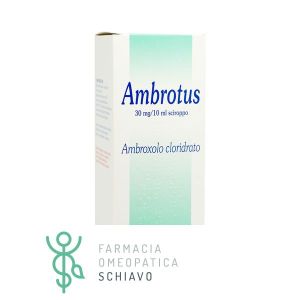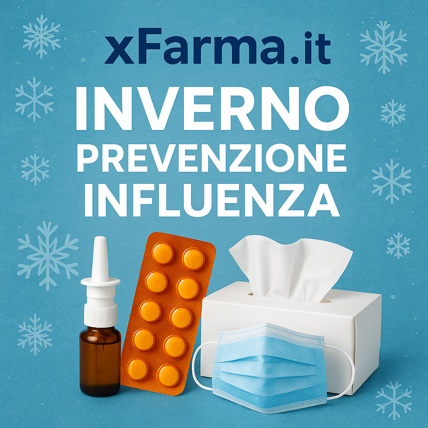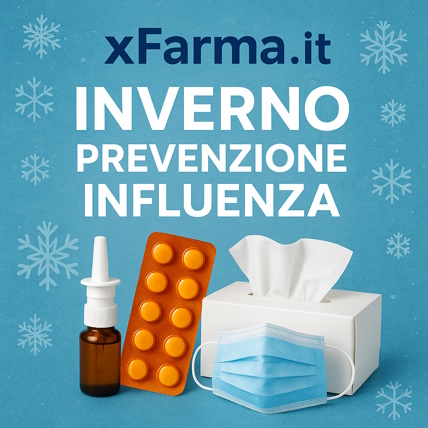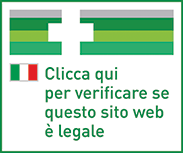Ship in Europe, Find out rates!
Ambrotus Syrup Ambroxol hydrochloride Cough Bottle 200 ml

- box Delivery in Italy in 24/48 and free returns
- star3.000+ positive reviews
- dropboxOver 60,000 products in the catalog
Syrup based on Ambroxol hydrochloride .
Therapeutic indications
Ambrotus Syrup is used in the treatment of secretion disorders in acute and chronic bronchopulmonary affections.
Dosage and Posology
Ambrotus Syrup must be taken according to the following doses and methods:
- Adults: 10 ml (30 mg) 3 times a day.
- Children over 5 years: 5 ml (15 mg) 3 times a day
- Children 2 to 5 years: 2.5ml (7.5mg) 3 times a day
It is recommended to take the syrup after meals. Do not use AMBROTUS for prolonged treatments.
Overdose
No specific symptoms of overdose in humans have been reported to date. Symptoms observed in cases of accidental overdose and / or medication errors are consistent with the expected side effects of Ambrotus at recommended doses and may require symptomatic treatment.
Contraindications
- Hypersensitivity to ambroxol hydrochloride or to any of the excipients
- Severe hepatic and / or renal disorders
- Taking the medicine is contraindicated in case of rare hereditary diseases that may be incompatible with one of the excipients
- The medicine is contraindicated in children under 2 years of age (for oral forms)
Side effects
Undesirable effects listed by frequency are reported, using the following convention: Very common (≥1 / 10); common (≥1 / 100 to <1/10); uncommon (≥1 / 1,000 to <1/100); rare (≥1 / 10,000, <1 / 1,000); very rare (<1 / 10,000), frequency not known (cannot be estimated from the available data).
- Immune system disorders:
- Rare: hypersensitivity reaction
- Not known: anaphylactic reactions, including anaphylactic shock, angioedema and pruritus.
- Skin and subcutaneous tissue disorders:
- Rare: rash, urticaria. Not known: severe cutaneous adverse reactions (including erythema multiforme, Stevens Johnson syndrome / toxic epidermal necrolysis and acute generalized exanthematous pustulosis).
- Nervous system disorders:
- Common: dysgeusia (altered taste).
- Gastrointestinal disorders:
- Common: nausea, oral hypoesthesia.
- Uncommon: vomiting, diarrhea, dyspepsia, abdominal pain, dry mouth.
- Not known: dry throat. Heartburn has also been reported.
- Respiratory, thoracic and mediastinal disorders:
- Common: pharyngeal hypoesthesia. Not known: bronchial obstruction.
- Renal and urinary disorders
- Rare: Dysuria
- General disorders and administration site conditions
- Rare: Fatigue
Pregnancy and breastfeeding
Ambroxol crosses the placental barrier. Animal studies have not shown any direct or indirect harmful effects on pregnancy, embryo / fetal development, parturition or postnatal development. Although preclinical studies and extensive clinical experience have not shown any harmful effects on the fetus after the 28th week of gestation, it is recommended that normal precautions be taken when taking medicines during pregnancy. Especially during the first trimester it is not recommended to take ambroxol.
The medicine is excreted in breast milk, therefore the use of ambroxol is not recommended during breastfeeding. Although no adverse effects are expected in breastfed infants, the use of ambroxol hydrochloride is not recommended during breastfeeding.
During pregnancy and breastfeeding, the medicine should be administered only in case of real need and under the direct supervision of the doctor.
Special warnings
There have been reports of severe skin reactions such as erythema multiforme, Stevens Johnson syndrome (SJS) / toxic epidermal necrolysis (TEN) and acute generalized exanthematous pustulosis (AGEP) associated with the administration of ambroxol. If symptoms or signs of progressive skin rash (sometimes associated with blistering or mucosal lesions) are present, treatment with ambroxol should be stopped immediately and a physician consulted. Also in the early stage of Stevens Johnson syndrome or toxic epidermal necrolysis (TEN), patients may initially experience non-specific flu-like symptoms such as fever, chills, rhinitis, cough and sore throat.
Due to these misleading symptoms it is possible that symptomatic treatment with cough and cold therapy may be undertaken. If new lesions of the skin or mucous membranes occur, consult your doctor immediately and precautionary discontinue treatment with ambroxol hydrochloride. In case of mild or moderate renal insufficiency, ambroxol hydrochloride can only be used after consulting your doctor. As with any medicinal product with hepatic metabolism followed by renal elimination, accumulation of the metabolites of ambroxol generated in the liver may be expected in the presence of renal insufficiency. Ambroxol should be administered with caution to patients with peptic ulcer. Mucolytics can induce bronchial obstruction in children less than 2 years of age. In fact, the drainage capacity of the bronchial mucus is limited in this age group, due to the physiological characteristics of the respiratory tract. They should therefore not be used in children under 2 years of age.
The drug contains sorbitol: patients with rare hereditary problems of fructose intolerance should not take this medicine.
Expiration and retention
Check the expiration date indicated on the package. The expiry date indicated on the package refers to the product in intact packaging, correctly stored. This medicine does not require any special storage conditions.
Warning: do not use the medicine after the expiry date indicated on the package. Store at a temperature not exceeding 25 ° C.
Composition
100 ml of Ambrotus Syrup contain:
Active principle
Ambroxol hydrochloride 300 mg
Excipients
Hydroxyethylcellulose, 70% sorbitol; glycerol, benzoic acid, black cherry flavor, propylene glycol, tartaric acid, purified water.
| Destination | Cost | Detail |
|---|---|---|
| Italy | €5,00* | 72H |
| Austria, France, Germany, Slovenia | € 13* | 3 days |
| Belgium, Luxembourg, Portugal, Netherlands, Spain | € 14* | 4 days |
| Bulgary, Cechia, Hungary, Poland, Romania, Slovakia | € 19* | 5 days |
| Denmark, Estonia, Finland, Ireland, Lithuania, Latvia ,Sweden | € 22* | 5 days |
| United Kingdom, Switzerland, Greece, Malta/td> | € 30* | 7 days |
| Canada | € 40 | 7 Days |
European shipments with express courier: FedEx, MBE, DHL
*For the shipment outside band B ther's an extra cost of 22€ *For the shipment outside band C ther's an extra cost of 30€ Delivery Times exclude Saturday and Holidays
For Islands and Areas of difficult Accessibility the shipments are made in 72 hours and the cost will be increased by 15€


